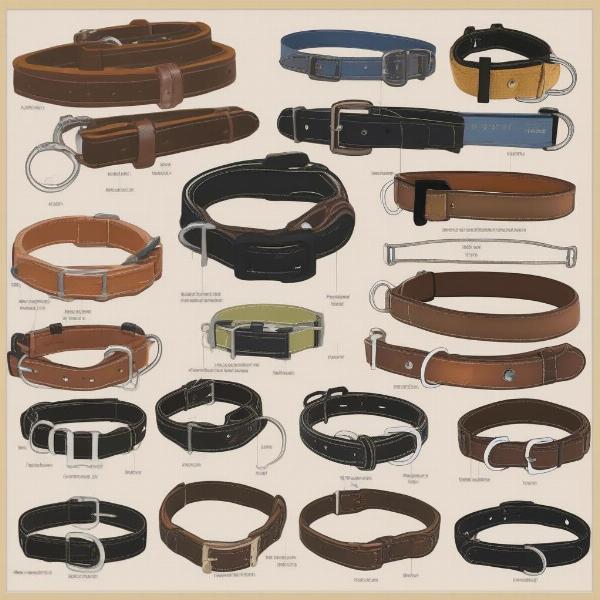Working dog collars are an essential piece of equipment for dogs with jobs, from herding livestock to assisting law enforcement. Choosing the right collar is crucial for both the dog’s comfort and its ability to perform its duties effectively. This guide will explore the different types of working dog collars, their uses, and how to choose the best one for your canine partner.
 Different Types of Working Dog Collars
Different Types of Working Dog Collars
Types of Working Dog Collars
There are several types of working dog collars, each designed for specific tasks and working conditions.
Leather Working Dog Collars
Leather collars are a classic choice, known for their durability and strength. They often develop a comfortable patina with age, conforming to the dog’s neck. However, they can be heavier than other materials and require regular maintenance to prevent cracking or stiffness.
Nylon Working Dog Collars
Nylon collars are lightweight, waterproof, and easy to clean, making them ideal for dogs working in wet or muddy conditions. They are also available in a wide range of colors and styles. However, nylon can sometimes chafe a dog’s fur, particularly if the dog has sensitive skin.
Padded Working Dog Collars
Padded collars offer extra comfort for dogs who wear their collars for extended periods. The padding helps distribute pressure evenly around the neck, preventing rubbing and irritation. These are especially beneficial for dogs pulling heavy loads or engaged in strenuous activities.
Working Dog Collars with Handles
Collars with built-in handles provide a convenient way to control and guide the dog, particularly in close quarters or during training exercises. They can also be helpful for assisting a dog over obstacles or into vehicles.
Choosing the Right Collar
Selecting the right working dog collar depends on several factors, including the dog’s breed, size, job, and working environment. Consider the following:
- Size and Breed: Larger breeds and those with powerful necks require stronger, more durable collars.
- Job: A herding dog might need a different collar than a police dog. For example, a herding dog may benefit from a wider collar to distribute pressure when gripping livestock, while a police dog may need a tactical collar with quick-release features. do you get paid for dog fostering
- Environment: Dogs working in wet conditions require waterproof collars.
- Comfort: Always prioritize the dog’s comfort. Ensure the collar fits properly and doesn’t chafe or restrict movement. vari kennel dog crate
Fitting a Working Dog Collar
A properly fitted collar is essential for both comfort and safety. It should be snug enough to prevent slipping over the dog’s head but loose enough to allow two fingers to fit comfortably between the collar and the dog’s neck.
Caring for Your Working Dog’s Collar
Regular cleaning and maintenance will extend the life of your working dog’s collar. Leather collars require conditioning to prevent cracking, while nylon collars can be washed with mild soap and water. Inspect the collar regularly for signs of wear and tear and replace it if necessary.
Conclusion
Choosing the right working dog collar is a critical decision for any working dog owner. By carefully considering your dog’s specific needs and following the guidelines in this article, you can ensure your canine partner has a comfortable, safe, and effective collar that allows it to perform its duties with ease. best bark collar for stubborn dogs
FAQ
- How tight should a working dog collar be? Snug enough to prevent slipping, but loose enough to allow two fingers to fit between the collar and the dog’s neck.
- What is the best material for a working dog collar? It depends on the dog’s job and environment. Leather is durable, nylon is waterproof, and padded collars offer extra comfort.
- How often should I clean my dog’s collar? Regularly, depending on the material and how dirty it gets.
- Can I use a regular collar for a working dog? It’s recommended to use a collar specifically designed for working dogs, as they are typically more durable and suited for the demands of their job. western collars for dogs
- Where can I buy working dog collars? Pet supply stores, online retailers, and specialty dog equipment stores. dog tick & flea treatment
- What are the signs that a working dog collar is too small? Chafing, redness, or hair loss around the neck.
- Are there specific collars for different types of working dogs? Yes, there are collars designed for specific tasks like tracking, herding, or protection.
ILM Dog is your trusted source for all things dog-related. We offer expert advice on dog breeds, health, training, nutrition, grooming, and much more. Whether you are a seasoned dog owner or just starting out, ILM Dog has the resources to help you provide the best possible care for your canine companion. Contact us today for all your dog-related needs! Email: [email protected], Phone: +44 20-3965-8624.